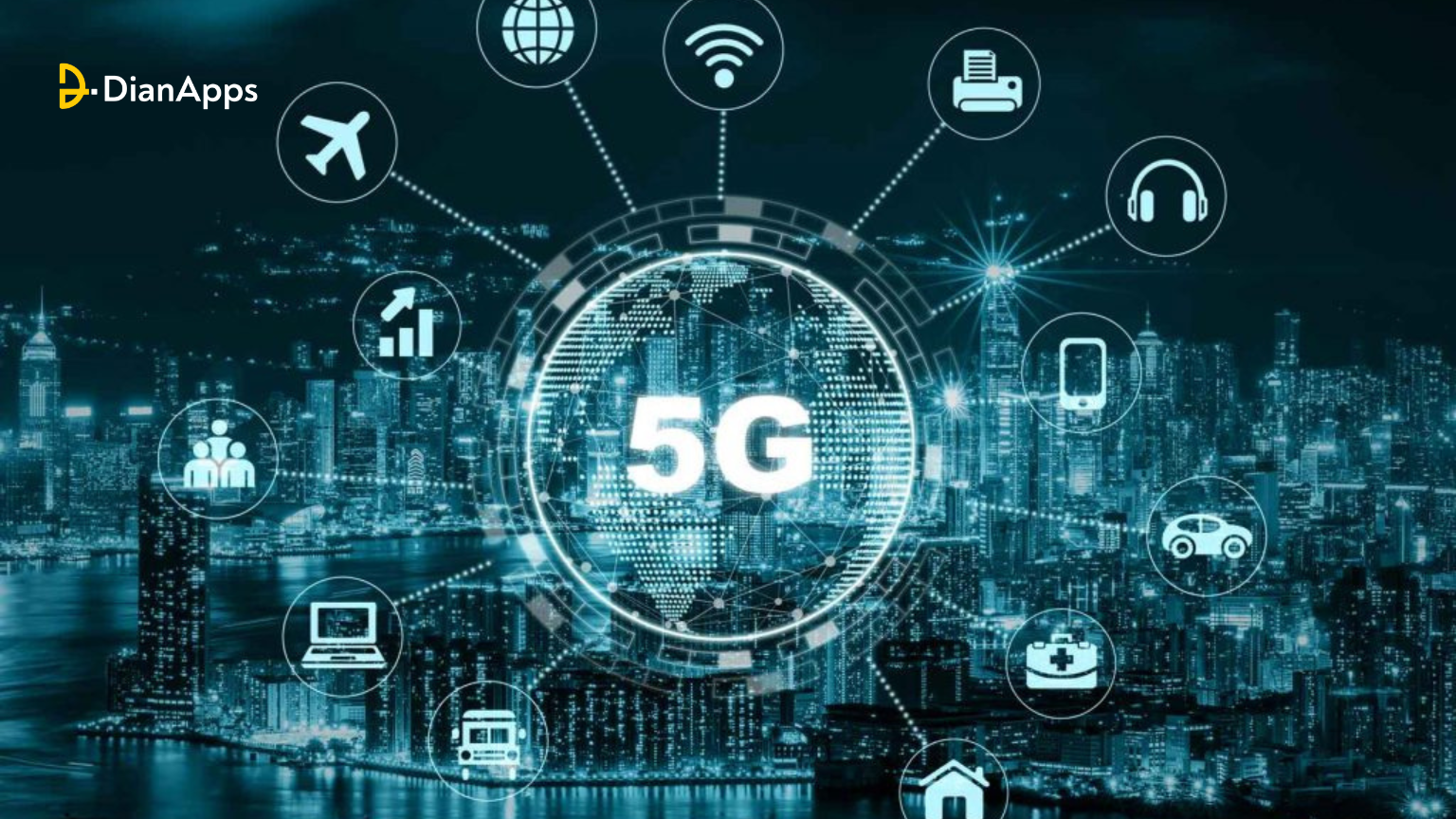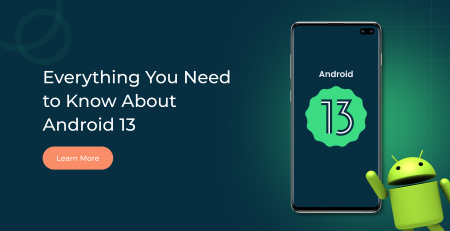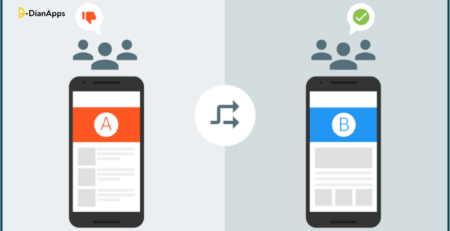5G Technology and Its Impact on Mobile App Development
The year 2019 saw the rise to the latest 5G– fifth-generation technology focusing on widespread verticals to enhance mobile phone connectivity across all cellular networks. But what exactly does 5G represent? And how is it impactful on mobile app development services? We’ll see that in this blog.
Back in the twenties, with the use of 3G & 4G in mobile apps, app developers primarily performed compatibility testing and bandwidth optimization, invested in real-time conversing apps, and more to build some groundbreaking mobile apps that you use even today.

So, why was there a need to add 5G if everything was functioning just fine? Well, to compete with brand-new innovations such as Artificial intelligence, the Internet of Things, and Big Data, you can’t rely on old versions of the cellular networks. You would require a compatible, sync-able, and versatile technology standard to leverage the tremendous app development opportunities.
Therefore, the market saw the rise of 5G technology innovation.
Before we head forward with the blog, there are certain iOS & Android app development trends we want you to look into that are useful for the 5G technology integration along with the trends.
The Transformation of Cellular Technology
Let’s begin by going back in time and quickly going over the development of cellular technology. Examine the following list to learn about the history of telecommunications and what happened before 5G:

1G
The first wireless communication generation, or 1G, was unveiled in the late 1970s and was called analogue voice. Its data transmission speed was about 2.4 kbps, and its primary function was to facilitate calls between mobile phones.
2G
After more than ten years, 2G became the first digital cellular network. Users could send and receive text messages, make phone calls, and transfer data at a speed of about 50 kbps, in addition to having access to the internet.
3G
The third generation of cellular technology spurred the emergence of smartphones in the early 2000s. With an assured internet speed of about 2 Mbps, users could now email photos and make video calls.
4G
In 2007, 4G became the LTE generation cellular network. At the moment, it is the most widely used wireless technology and the standard. It guaranteed a data speed of about 100 Mbps and opened the door to many possibilities, including live streaming, gaming, data-rich apps, and more.

5G
The next generation of telecoms is here. It guarantees gigabit-per-second, or Gbps, data transfer rates. Three spectrum brands—high, mid, and low—are used to provide improved connections across areas. The technology is improving the infrastructure for wireless communication and driving the creation of next-generation apps.
What about 6G?
Even though the invention of the 6G is in progress in the technology market, rumors have already ignited across the globe. As per experts, 6G networks will likely be significantly faster than 5G with more diversity and extensive support across applications beyond current mobile use scenarios such as ubiquitous instant communication, pervasive intelligence, and the Internet of Things.
With mobile edge computing, artificial intelligence (AI), short-packet communication, and blockchain technologies supporting local spectrum licensing, spectrum sharing, infrastructure sharing, and intelligent automated management, it is anticipated that mobile network operators will embrace flexible, decentralized business models for 6G.
Critical Statistics You Should Know About 5G Technology
In 2019, the headlines spread the news of 5G technology across the global community. Since then, it has not stopped astonishing people all around the world and influencing several other fields and industries outside the telecom sector. The following are fascinating data and information on 5G that you should be aware of:
- Globally, there are already over 240 million 5G users.
- By the end of 2026, there should be over 4.8 billion 5G subscriptions globally.
- In August 2022, we were using the 220 commercial 5G services.
- Although the COVID-19 pandemic has resulted in a decline in sales of non-essential commodities, sales of smartphones that are compatible with 5G technology are increasing and are expected to account for 69 percent of smartphone shipments this year.
- Alongside Apple and Xiaomi as the major competitors and participants in the market, Samsung is leading the 5G smartphone market.
- The industrial sector alone predicts to see 227 billion US dollars in economic benefits from 5G by 2030.
- By 2025, consumer electronics and automotive applications are estimated to account for 21.7% and 21.7%, respectively, of the 5G infrastructure.
- According to the data, 5G will undoubtedly transform some global businesses and sectors and have a significant impact on the advancement of several technologies and sectors, including healthcare, smart homes, driverless vehicles, and more.
Fundamental Features & Characteristics of 5G Technology

You need to be aware of 5G technology’s salient traits and features to comprehend its implications. Here are a few salient features of the same:
Reduced latency
The time it takes for data to move over a network or network latency, is the delay in network communication. In simple terms, performance and speed improve with decreasing latency. A 4G network typically has a latency of about 50 ms. It will be around one millisecond with 5G, which will eliminate delays and interferences.
Increased density of connections
The capacity of a network to send data in a densely populated region is known as connection density. The availability of smartphones, wearables, gadgets, and other devices has led to an increase in the number of devices per user; therefore, the network has to be able to connect and service the nodes efficiently. 5G will guarantee the same and bring with it increased network density.
Increased performance and speed
We have gone a long way from having to wait hours to get an mp3 file to having complete movies downloaded in just a few minutes. With 5G, the experience will be much better since customers will be able to download apps and content quickly. App performance and speed will rise along with the expediting of in-app purchases, payments, and other procedures.
Increased bandwidth
The unit of measurement used to represent the pace of data flow across a confident route is called bandwidth. With higher radio frequencies and shorter wavelengths, 5G will provide more bandwidth and improved connection. Once more, it will effortlessly link several devices and guarantee seamless communication even in congested spaces.
Long-lasting batteries
Device battery drain may decrease with the aid of lower latency, less interference, faster speed and performance, and seamless communication. 5G will significantly extend the lifespan of smartphones and other IoT devices by guaranteeing these characteristics. Additionally, users will be able to utilize applications continuously for extended periods.
If you haven’t read about the Victorious IoT, Bots, and Mobile apps– Trident for the Future. You are missing out on a lot! But hey! We have you covered, continue to discover more!
The Impact Of 5G Technology On Mobile App Development
5G is reshaping the mobile-centric sectors and opening doors for unique innovations in the mobile app space. How will 5G technology impact the iOS and Android app development services?
Strong data transfer
Applications that are scalable and data-rich can benefit from enhanced data transfer and cloud interoperability. With 5G, storing and accessing massive amounts of data will be more straightforward.
Computing will become more cloud-centric, and the technological infrastructure will be less taxed. In reality, due to the breakneck transmission speeds, file transfers to the cloud will be easier and faster, and users will have seamless access to data.
Faster connection
Physical limitations won’t hamper connectivity as reliance on hardware decreases. Users will be able to rapidly connect with others and improve real-time networking and communication as a result.
It will become easier to create scalable, intelligent city apps and link residents to a centralized monitoring and maintenance system. Governments will gain from it as well since it will make administration easier with the release of high-performing surveillance applications and improved citizen connectedness.
Improved gameplay encounter
Of all the app genres, the gaming app market is the largest. The current industry valuation is billions of dollars, and it is expanding at an exponential rate. With 5G in place, speed and performance limitations will lower, which will lead to an increase in the number of gaming apps available.
On their cell phones, users will be able to play games that rival those of a console. It will be simpler to start and play games, particularly those that depend on online access and back-and-forth user interactions. The level of gameplay will increase significantly.
Seamless streaming of videos
Similar to games, entertainment applications have grown in popularity in app stores, and the majority of these apps depend on solid audio and video streaming. In reality, video content is being used by applications for education and eCommerce development solutions, among others, to engage and connect with users.
With 5G, developing media-rich apps and providing customers with a seamless video streaming experience will be simpler. Watching videos will be a pleasure because of high-definition live streaming, longer battery life, and quicker transmissions.
IoT integration
The Internet of Things, or IoT, has been a popular term for some time now. We can link to so many different things, devices, products, or people thanks to technology. Using digitally powered gadgets to create intelligent workspaces or even smart homes has become simple thanks to the Internet of Things.
With 5G already in the picture, data transfer and connecting numerous IoT-enabled devices will be more straightforward than ever. As per tech experts, the Internet of Things welcomes more than one-way usage, which will inspire developers to create additional apps that guarantee connection and intelligent living.
Improved VR and AR experience
Every business is using AR/VR (Augmented Reality/Virtual Reality) technology, from gaming to healthcare, eCommerce to real estate, finance to education. AR/VR technology is nothing short of magical, as it allows users to experience properties and products virtually and blurs the line between the actual and the physical world.
5G promises lower latency, higher bandwidth, and improved performance, so AR and VR will start to shine on a big scale. The potential uses for AR and VR will increase as immersive technologies reach new heights in the mobile app market.
Hire DianApps in case you are in search of an AR/VR app development company.
Enhanced GPS functionality
Around us, many apps empower GPS technology. It offers numerous activities across sectors, from food delivery to taxi booking, on-demand services, to location-centric content customization. 5G is expected to boost the need for these apps and improve the functionality of already-available ones.
5G’s strong connection and speed will make it possible to send precise data quickly. There will be more room for these kinds of apps and services as tracking shipments and orders, obtaining precise locations of persons and items, and other related operations grow more straightforward and more efficient.
That’s a Wrap
Global public interest in 5G has been in the limelight since its launch. Despite a few conflicts and conspiracy theories, it still influences and inspires progress. A lot of hardware manufacturers are concentrating on developing and releasing 5G-enabled products.
5G is having a significant influence on the development of both hardware and software, including mobile devices and apps. Above all, 5G technology is enabling developers to think creatively and scalably, allowing them to design and release programs that power humanity and improve and ease our lives.
Developing mobile applications will undoubtedly go more smoothly as 5G powers out gadgets and no-code app builders to streamline the process of developing mobile apps. The experience of using apps and interacting with users will ultimately improve and support mobile commerce as well as other mobile-based companies and services.
If you enjoyed reading this, be sure to check out our other blogs to receive more information about creating, promoting, and maintaining mobile apps. Please share your thoughts with us on 5G technology and how it will affect and alter the trajectory of our future.




